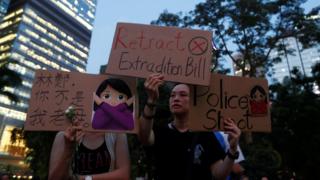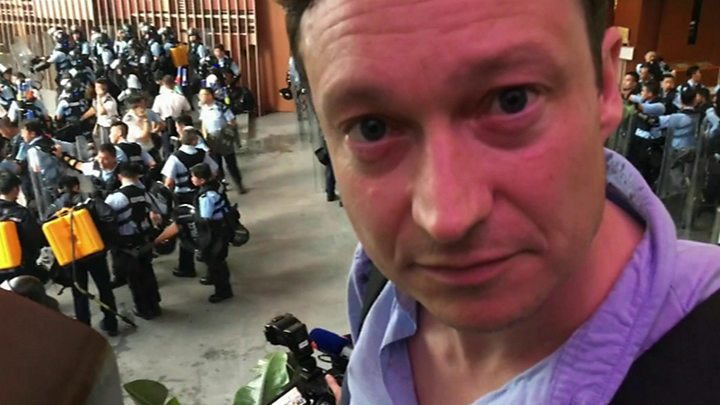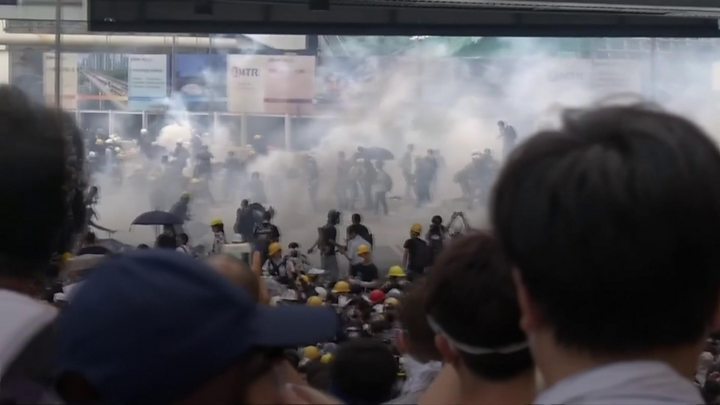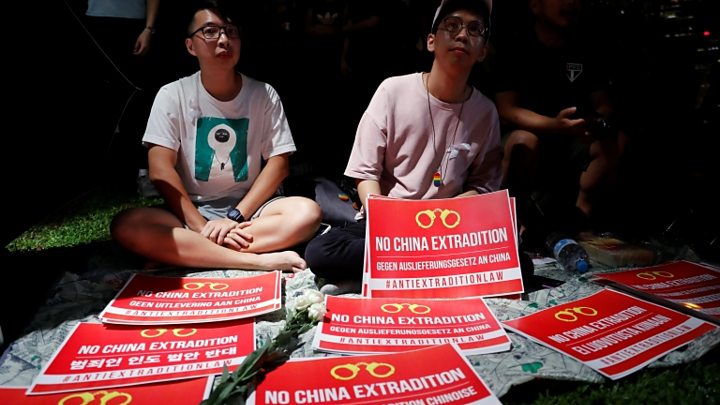 Image copyright
Image copyright
Reuters
Hundreds of thousands of people have protested against the plans
The Hong Kong government has suspended its highly controversial plan to allow extraditions to mainland China, Chief Executive Carrie Lam has announced.
She had previously refused to scrap the bill despite mass protests from Hong Kong residents.
“I feel deep sorrow and regret that deficiencies in our work – and various other factors – have stirred up substantial controversies,” she said.
Protesters expressed concern at increased Chinese influence.
Ms Lam said she had heard the calls for her government to “pause and think”.
She also admitted that the “explanation and communication” of the bill had not been adequate.
She said her goal was “the greatest interests of Hong Kong”, which involved first restoring peace and order.
The government had argued the proposed extradition bill would “plug the loopholes” so that the city would not be a safe haven for criminals, following a murder case in Taiwan.
- All you need to know about the protests
- Hong Kong-China extradition plans explained
- Who are the protesters?
- Will the bill damage Hong Kong’s star status?
Ms Lam said that the urgency felt to pass the bill before the legislative year ends “perhaps no longer exists”.
No date has been set for “the next step forward”, she said.
Image copyright
AFP
Carrie Lam announced the climbdown after mass protests
Hundreds of thousands of people have protested against the bill and further demonstrations were planned for Sunday.
But critics said the legislation would expose people in Hong Kong to China’s deeply flawed justice system and lead to further erosion of the city’s judicial independence.
‘Striking U-turn’
Analysis by Helier Cheung, BBC News, Hong Kong
It was a striking U-turn from a leader who previously struck a defiant tone.
Mere days ago, Ms Lam had vowed to press ahead with the unpopular legislation – now she has promised to “listen to different views from society”.
But for many protesters, the damage has already been done, and the move to delay – but not cancel – the legislation is unlikely to assuage their concerns.
One protester told me he believed the government was “trying to divert attention away until opposition calms down – and then they’ll try to re-do the whole process again”.
Others said they would still take part in a march against the proposal planned for Sunday.
“Our final goal is to cancel the law, not to pause it. I think there will still be many people coming out tomorrow,” a student leader told me.
Hong Kong is a former British colony, but was returned to Chinese rule in 1997 under a “one country, two systems” deal that guarantees it a level of autonomy.
What was the controversy about?
The changes would allow for criminal extradition requests from authorities in mainland China, Taiwan and Macau – decided on a case-by-case basis by Hong Kong courts.
It comes after a high-profile case where a Hong Kong man was accused of murdering his girlfriend on holiday in Taiwan but could not be extradited.
Hong Kong officials, including Ms Lam, say the bill is necessary to protect the city against criminals.

But many fear the law could be used to target political opponents of the Chinese state.
Opposition activists also cite the alleged use of torture, arbitrary detentions and forced confessions in mainland China.
How did protests unfold?
A large-scale march, which organisers said drew more than one million people, was held last Sunday.
Then on Wednesday tens of thousands gathered to blockade streets around government headquarters to try to stop the second reading, or debate, of the extradition bill.
Tensions boiled over and 22 police and 60 protesters were injured. Authorities say 11 people were arrested.
The police, who used tear gas and rubber bullets, have been accused of excessive force by some rights groups.

Until Saturday’s announcement, Ms Lam had not spoken publicly since she labelled the protests “organised riots” during a tearful address.

Is Hong Kong part of China?
Hong Kong was a British colony from 1841, when China ceded the island to the British after the First Opium War – which had erupted over British traders smuggling opium into China. It remained a colony until sovereignty was returned to China in 1997.
It is now part of China under a “one country, two systems” principle, which ensures that it keeps its own judicial independence, its own legislature and economic system.
It is what China calls a special administrative region – enjoying a great deal of autonomy that has made it a key business and media hub in the region.
But it remains subject to pressure from mainland China, and Beijing remains responsible for defence and foreign affairs.
- Beijing’s struggle to win Hong Kong’s young hearts
- The Hong Kong handover in a nutshell
- A timeline of Hong Kong’s history
Why are people angry about the plan?
People in Hong Kong are worried that the extradition bill could bring Hong Kong more decisively under China’s control.
Hong Kong officials had said its courts would have the final say whether to grant extradition requests.
Ms Lam’s government had also said suspects accused of political and religious crimes would not be extradited, insisting legally binding human rights safeguards would also be in place.
Hong Kong extradition protests: Government suspends bill}

